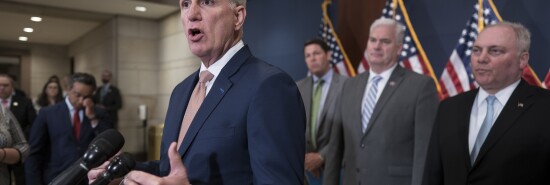
House Republicans’ first big legislative test
Washington Examiner
Despite the lengthy battle Speaker Kevin McCarthy needed to take control of the chamber, House Republicans have already netted some impressive victories. They forced President Joe Biden to issue his first veto to protect his costly and wrongheaded environmental, social, and governance regulations that will raise domestic energy prices and slash pensioners’ income from retirement investments.
House Republicans also shielded the District of Columbia from a woefully weak crime bill that would have encouraged violence and theft. Not even Biden could defend the D.C. Council’s dangerous legislation — he was forced to flip-flop from supporting D.C.’s Democrats to siding with the commonsense tough-on-crime policies of the Republican Party.
CALIFORNIA ADMITS ITS CLIMATE PLAN ENRICHES WEALTHY AND IMPOVERISHES POOR
But rolling back bad federal regulations and rejecting bad D.C. Council laws are not the same as legislating. House Republicans have yet to show they can get their act together as a team to secure a legislative victory that would benefit the nation as a whole.
That could change this week as the House takes up H.R. 1, the Lower Energy Costs Act. This is something House Republicans urgently need to pass. The bill is full of smart policy changes, including a ban on states blocking interstate infrastructure projects (such as transmission and pipelines), a $6 billion tax cut on natural gas production, and fairer revenue-sharing between states and the federal government from energy produced on public lands.
The bill cuts $27 billion in EPA slush funds that were part of Biden’s inflation-causing Inflation Reduction Act and repeals Biden’s bans on fracking and natural gas exports and imports.
More importantly, the bill takes aim at the single biggest factor making U.S. infrastructure projects unnecessarily expensive: the 1970 National Environmental Policy Act. This lets environmental activists block any infrastructure project that uses even a dime of federal monies or requires the approval of even one federal agency. The average NEPA review of a federally funded project takes more than 4 1/2 years and costs $4.2 million. Often, projects, such as the Keystone XL pipeline, are delayed to death by NEPA lawsuits.
The Lower Energy Costs Act would bring much-needed reform to a 50-year-old law that is the leading cause of higher construction costs. The bill would set a 120-day deadline for filing NEPA lawsuits and set a cap of two years for environmental review. It would also exempt low-impact projects on previously studied lands from NEPA lawsuits.
Not only would getting the Low Energy Costs Act across the finish line in the House represent a real accomplishment for Republicans, but it would also set up bipartisan action, either as a stand-alone measure or as something Republicans could secure in exchange for raising the debt limit.
Sen. Joe Manchin (D-WV) has been noticeably unhappy with Biden’s implementation of the energy elements of the Inflation Reduction Act. Other Democrats know the green energy projects they want developed will go nowhere until Washington delivers permitting reform.
The first step is to get the legislation through the House. Republicans should finish that job this week.
